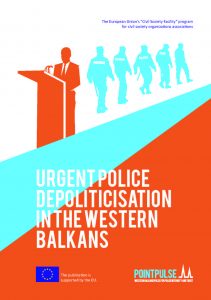URGENT POLICE DEPOLITICISATION IN THE WESTERN BALKANS
URGENT POLICE DEPOLITICISATION IN THE WESTERN BALKANS
Author(s): Sofija Mandić
Subject(s): Politics / Political Sciences, Politics, Governance, Government/Political systems, Security and defense, Geopolitics
Published by: BCBP Beogradski centar za bezbednosnu politiku
Keywords: politicisation; Western Balkans; operational independence
Summary/Abstract: One of the biggest problems faced by the police in the Western Balkans is politicisation and lack of operational independence from political leaders and structures. This is confrmed by the legal framework on policing which introduces a wide scope of competencies of Ministers of Interior and other politically elected figures, and by the citizens’ perception that the police serve the political parties’ interests. The Bosnia and Herzegovina (BIH) Law on Internal Affairs of 2014 allows direct and indirect influence of political parties and officials on the autonomy of the police. Most important shortcomings are related to the Federal Minister of Interior who is allowed to make decisions regarding concrete police actions, influence human resources micro-management, and decide on the use of police finances and detention treatment and rules. The Law only declaratively stipulates that the police are subjected to civilian and democratic control. However, more than 80 percent of the citizens of BIH believe that the influence of politics on operative work of the police is quite high. In Kosovo, before the Prime Minister takes a decision on the appointment of Police Director General, the Minister of Internal Affairs interferes in the process by establishing and regulating the work of the Commission whose task is to nominate the candidates. The 2012 Law on Police in Kosovo allows direct influence of the Minister of Internal Affairs on the internal organisation of the police and the establishment of special police units. The Minister can compromise the operational independence of the police regardless of the fact that the Law on Police stipulates otherwise. More than 70 percent of the citizens perceive police as politicised and fully, or to some extent, under political control. The Montenegrin Law on Internal Affairs of 2012 allows the Minister of Interior to influence the Police Director’s appointment by proposing the candidate to the Government, and to influence the work of the Police Directorate by appointing Police Director’s deputies. The Minister is allowed to define the exceptions concerning the duties that are deemed incompatible with police work, but he also has discretionary powers to allow police officers to conduct some activities that are in contravention to the rules if he estimates that this will not harm the professional work of the Ministry. The Minister can decide in disciplinary proceedings and develop its rules. The public image of the police as an authority serving the citizens is better, to the extent that the legal framework is more progressive – one third of the citizens believe that the police is working in their interest. The Serbian Law on Police of 2016 does not create sufficient and necessary conditions for depoliticisation of the police. The text of the law mentions “respect for the operational independence of the police” but fails to specify what that actually means. The Minister of Interior is allowed to prescribe the mode of performance of internal affairs tasks, request reports, data and other documents relating to the work of the police and the Ministry, and provide the Internal Affairs Sector with binding instructions for work, as well as with orders to perform certain tasks and undertake certain measures. The Minister is given the power to assign and dismiss the highest ranking heads of the Police Directorate. More than 80% of the citizens see the police as an institution serving others’ interests instead of theirs. There are various legal shortcomings influencing the operational independence of the police in the Western Balkans. It is therefore necessary that the international community – the European Union (EU) in particular – advocate the development of legal instruments and institutional mechanisms which will prevent the political leaders and structures from crossing the forbidden line and becoming involved in the operational work of the police.
Series: BCBP - Assessment of Police Integrity
- Page Count: 13
- Publication Year: 2016
- Language: English
- Content File-PDF

